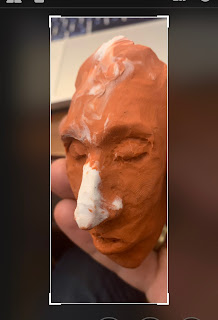Yesterday on YouTube I larked into a performance of the Rolling Stones' new hit song, "Sympathy for the Devil" on The David Frost Show, from November 30, 1968, on the BBC.
The band is young and beautiful, still innocent and nervous, and not yet bereaved-and-freaked-out by the death (a likely murder), some 7 months later, of Brian Jones, who plays piano con brio here. Mick Jagger's youthful androgynous loveliness is quite striking, and he's apparently feeling shy about taking off his shirt, which he does in stages, hunched over as if to conceal himself. The performance is just different enough from the studio record that it's pretty clear it's not a lip-synch, though the lead guitar sounded pretty much the same to me (superb, that is). But the lyrics are among the best Jagger ever penned, and because he vocalizes in that special, yelling way of his, it's not always clear exactly what the hell he's saying. The song was new at this point, and I wish he had sold it better on The David Frost Show. Well and good.
After the performance we learn that the other guests include the young Shakespearean actor Nicol Williamson, who in 1969 would star in Tony Richardson's excellent film of Hamlet, opposite Mick Jagger's then-girlfriend, Marianne Faithful, as Ophelia, with Michael Pennington as Laertes, and Anthony Hopkins as Claudius.
Here on the David Frost show, Williamson is feeling cranky, coming off as young and rather insecure, taking issue with everything anyone else has to say. He does a decent reading-aloud of a scary passage from Samuel Beckett about death, the subject of the segment, which had apparently been a troublesome obsession for him at this period. Other guests speak briefly and unremarkably... and then, at about 11min40sec, something wonderful and delightful and now entirely obsolete takes place:
Frost, the host of the show, invites the audience to express their personal opinions. He doesn't charge at them with a microphone, as American talk show hosts have done since the 1980's. The audience members simply raise their hands and he calls on them. "The lady in the front row" is a lady indeed, in a modest dress, handsomely middle-aged, looking self-assured and entirely in her element as a proper member of the British public who knows how to behave and expects others will do the same. Which they do. Before she begins to speak, Frost offers her a drink (!), which she declines, and then, in endearing plain talk, tells of her husband's having had a blissful and transformative near death experience---it's a misnomer, since like many patients, he was temporarily dead, but that's what we call them.
This forms a stark and happy contrast with the famous young actor's dismal terror of oblivion. Then the man next to her makes a quick point, expressed in a slightly clumsy way that nevertheless gets his meaning across, and it's a good one. The world appears to be infinite; it is real even though infinity is not rational; therefore we, too, might be infinite as well, without that being a special exception made just for us.
The whole thing is incredibly civilized, humane, easy, and pleasant. I feel envy (not jealousy; I want what they have, but I do not want to destroy it) and admiration. Something has been lost in the long meantime. I was born May 13th, 1968. Dr. King was killed April 4th; Robert F. Kennedy (D-NY), June 5th. But those were American traumas. They touched the British, too---"I shouted out, Who killed the Kennedys?" goes the song on this very show---but Vietnam was our disaster, not theirs. I get the sense that in 1968, the social fabric was tearing slightly slower in England than here. Civility and discourse; time to think and space to converse; norms of social behavior that provided scaffolding for interactions with strangers that made it relatively safe to roll the dice on humanity and have a chat in a pub with someone you didn't already know. Something has been lost, and this quaint, humbling, forgotten moment of British television encapsulates it.















































































